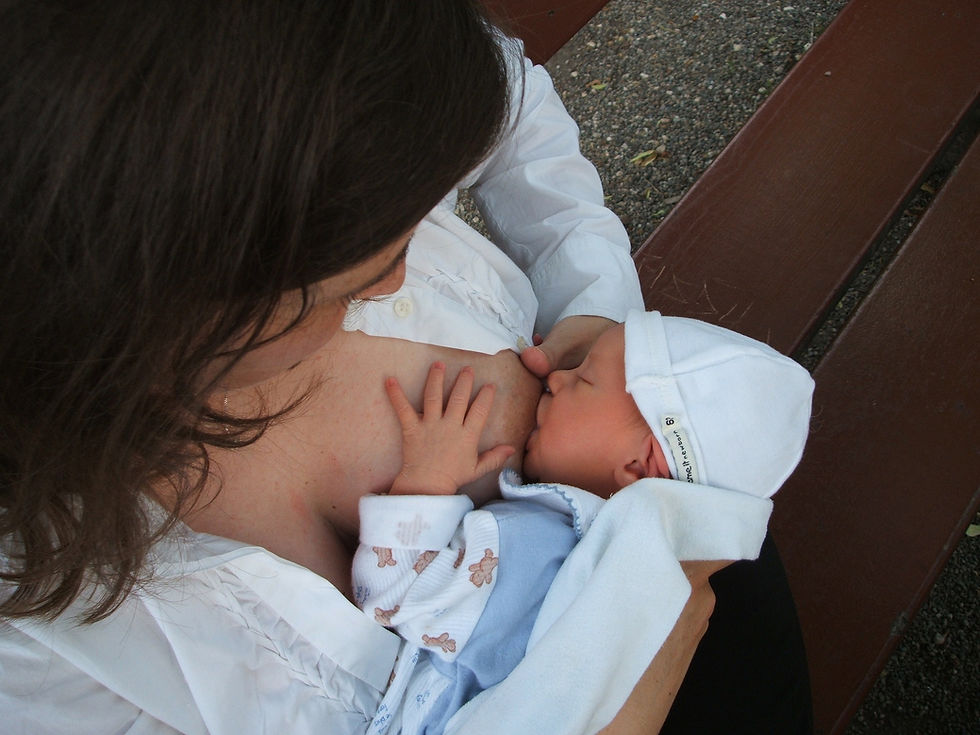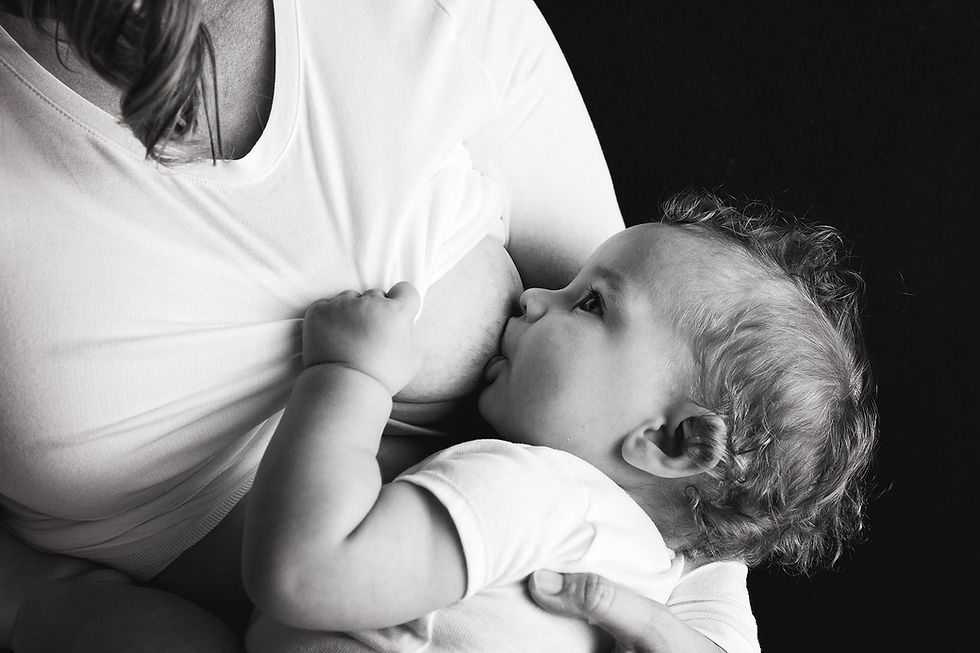What Facebook advice might not tell you about increasing your milk supply
- Oct 5, 2017
- 6 min read
Updated: Jan 17, 2021
If you ask for advice on increasing your milk supply on a ‘mummy’ Facebook group I can guarantee that you will probably get about 10 recipes for lactation cookies and smoothies, 5 telling you the directions to the nearest pharmacy that sells some sort of milk boosting concoction, a few telling you to get a prescription for domperidone, plus numerous more giving instructions to drink more water and eat things containing oats/barley/malt.
What they probably won’t tell you (or there will be 1 comment for every 50 which then gets lost in all the others) is that your best way to increase milk supply is to remove the milk already in your breasts, more often.

Let me give you the run down on milk production – while you’re pregnant your milk ducts grow and start to make the first milk, also known as colostrum. From about 16 weeks your breasts will contain colostrum and if your baby was born at any point after this you will most likely be able to make ‘mature’ milk. This is called ‘Lactogenesis I’.
What stops you from making large volumes of milk while you are pregnant is a hormone called progesterone, which stops the action of prolactin. Once your placenta is removed, progesterone levels drop dramatically and prolactin can do its job.
For the majority, milk ‘comes in’ around 36 to 72hrs after birth. There is a whole process that happens here to allow this, but I’m not going to bore you with lots of scientific info. This will happen regardless of a baby suckling on a breast (or a breast pump expressing the breast). This is called ‘Lactogenesis II’ or ‘endocrine control’ (endocrine = hormone driven)
Lactogenesis III or ‘autocrine control’ of milk production is what happens for milk supply to be maintained, or increased, over time. Autocrine = self driven, meaning that you need to keep telling your breasts to make more milk. And you do this by removing the milk that is already in your breasts, often.
As soon as you start removing milk from your breasts your body receives signals that it needs to start making more milk.
Now, if you were only to remove a small amount your body might start to think that it doesn’t need to make that much more. And as your breasts fill up with milk there is a feedback mechanism that tells your breasts ‘hey we’re getting full, no need to make any more’.
If you repeat this process over and over, your breasts will stop making milk. This is how you should wean from breastfeeding.
So if you want to increase your supply you should do the opposite - drain the milk that is in there AS MUCH AS POSSIBLE, as often as possible.
Some may say that you need to ‘empty’ your breasts – but your breasts will never actually be 100% empty, so this is a bit of a misnomer. What they should be saying is to ‘drain your breasts well’ – that means remove as much of the milk as you can, frequently.
If your breasts are ‘well drained’ your breasts will make more milk, more quickly, until they fill up and then that feedback mechanism kicks in. If you repeat this process often you should make more milk in total. Now it might take some time (a few days to even weeks), but over time you can increase your supply just by removing the milk that is in there.
Now how do you do this?
Well, if you want to breast feed, then you need to put your baby to the breast as soon as possible after birth. Yes your milk might come in regardless of whether you do this, but by how much may depend on how much the breasts are stimulated in those first few days.
Within the first hour is the recommendation if everyone is well enough. But if you have had a caesarean, or you or your baby aren’t well enough, then within the first 2 – 6hrs is OK. Don’t panic if this can’t be done – just express or feed as soon as you can.

Then keep putting baby to the breast, or expressing. At least 8 times in 24hrs is the MINIMUM (x10 feeds/day is average). For the first 24hrs they might not feed this many times, but you should feed them each time they want to feed – even if it has only been 30mins or so since the last feed.
Some women will make a full supply, or more, without feeding or expressing this often. But be warned I have heard of many instances of women having an oversupply for the first 6 to 12 weeks and they think that they only need to feed or express 4 or 5 or 6 times a day, and then their supply drops dramatically – an oversupply in the first 12 weeks is most likely cause by hormones going a bit ‘overboard’, and then if you haven’t been removing milk that often your body starts to think ‘oh, I don’t actually need to be making this much, I’ll stop’.
Of course there are always exceptions to these ‘rules’ – some people have hormone issues that will prevent them from ever making a full supply of milk, regardless of how many times they feed or express, or how well they drain their breasts. Or there are some who can get away with never feeding or expressing that often.
But before you go spending lots of money on herbs like fenugreek or brewer’s yeast, or blenders to make smoothies, think about how many times you are feeding or expressing, and how well are you draining your breasts.

If you have been feeding this often or more, and draining your breasts each time, but you still can’t seem to make enough then think about seeing a lactation consultant – sometimes the oral anatomy of the baby can prevent him/her from draining the breasts, or maybe the breast pump you are using just isn’t strong enough to do the job properly. Or maybe you have an underlying hormonal issue that is preventing you from making enough.
How will I know I am making enough
Generally speaking by the time your baby is 5 days old or so he or she should be passing enough urine to fill 5 to 8 nappies in 24hrs, plus have 3 or more ‘splats’ of yellow poo. After about 6 weeks or so, exclusively breastmilk fed babies may go up to 7-10 days without a poo – but before this any less than 1/day may be a sign of an issue. Ideally their weight should 'follow a curve'.
A sleeping baby may not be a well fed baby – if your baby is difficult to wake or doesn’t suck vigorously when feeding then it may be a sign that they are not getting enough and don’t have the energy to wake up. Of course everyone wants a baby that sleeps through the night, but for the first 6 weeks at least feeding every 2 to 4 hours around the clock is normal!

If you are expressing and bottle feeding then the general rule is 150 – 180mls/kg/day (use birth weight until they are their birth weight) in ~8 feeds/day. This applies until they are about 5kg, after that it is generally 750mls (+/- 250mls). Of course some babies may take less or more. Good output is the key to know that your baby is having good input. And of course if your baby has a medical issue then your doctor might tell you a different volume.
If you are directly breastfeeding and your baby has been feeding well, then suddenly becomes fussy, don’t automatically grab for the fenugreek or brewer’s yeast. Have a look at what is going on.
Breastfeeding isn’t just about feeding, it can also be about comfort – is your baby teething, or has something happened in their life where they want more comfort? There are also a few growth spurts along the way – 10 days, 6 weeks and 4 months are the well known ones. ‘Leaps’ are another time when babies may want to feed or suck more often – when your baby starts learning new things their brain development goes a bit ‘crazy’ and feeding/sucking can help calm them.
Your breasts feeling softer, not feeling a let down, or not being able to express much milk are also not signs that your supply has dropped – again look at your baby’s output and weight gain...if something is going in then chances are something will be coming out and if they are putting on weight, then chances are it is from the milk!
And as always, if you do feel like there is an issue seek advice – for breastfeeding your best bet is usually a lactation consultant (make sure they are an IBCLC).
To get breastfeeding support from Justine click here
To find out about renting or buying a Spectra® breast pump click here
To read other articles by Justine click here









































Comments